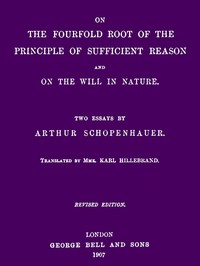On the Fourfold Root of the Principle of Sufficient Reason, and On the Will in…
"On the Fourfold Root of the Principle of Sufficient Reason and On the Will in Nature" by Arthur Schopenhauer is a philosophical treatise likely written in the early 19th century. The work explores the foundational concept of the Principle of Sufficient Reason, which posits that nothing happens without a reason for why it is so, and elaborates on how this principle manifests in various realms of knowledge. Schopenhauer emphasizes a systematic approach
to philosophy and lays the groundwork for understanding his broader philosophical system. The opening of the treatise introduces the importance of the Principle of Sufficient Reason, explaining its relevance to the foundations of knowledge and science. Schopenhauer discusses the methodological framework established by philosophers like Plato and Kant, stressing the need for clarity in defining principles of reasoning. He aims to separate the different applications of the principle and critiques past interpretations while suggesting a more nuanced understanding. This initial exposition sets the stage for a deeper investigation into how the principle permeates various branches of inquiry, underscoring its significance in grasping deeper philosophical truths. (This is an automatically generated summary.)
Read or download for free
| How to read | Url | Size | |||
|---|---|---|---|---|---|
| Read now! | https://www.gutenberg.org/ebooks/50966.html.images | 1.0 MB | |||
| EPUB3 (E-readers incl. Send-to-Kindle) | https://www.gutenberg.org/ebooks/50966.epub3.images | 591 kB | |||
| EPUB (older E-readers) | https://www.gutenberg.org/ebooks/50966.epub.images | 594 kB | |||
| EPUB (no images, older E-readers) | https://www.gutenberg.org/ebooks/50966.epub.noimages | 483 kB | |||
| Kindle | https://www.gutenberg.org/ebooks/50966.kf8.images | 907 kB | |||
| older Kindles | https://www.gutenberg.org/ebooks/50966.kindle.images | 805 kB | |||
| Plain Text UTF-8 | https://www.gutenberg.org/ebooks/50966.txt.utf-8 | 874 kB | |||
| Download HTML (zip) | https://www.gutenberg.org/cache/epub/50966/pg50966-h.zip | 514 kB | |||
| There may be more files related to this item. | |||||
Similar Books
About this eBook
| Author | Schopenhauer, Arthur, 1788-1860 |
|---|---|
| Translator | Hillebrand, Karl, Mme. |
| Title | On the Fourfold Root of the Principle of Sufficient Reason, and On the Will in Nature: Two Essays (revised edition) |
| Note | Wikipedia page about this book: en.wikipedia.org/wiki/On_the_Fourfold_Root_of_the_Principle_of_Sufficient_Reason |
| Credits |
Produced by Charlene Taylor, Sharon Joiner, Bryan Ness and the Online Distributed Proofreading Team at www.pgdp.net (This book was produced from scanned images of public domain material from the Google Books project.) |
| Reading Level | Reading ease score: 55.1 (10th to 12th grade). Somewhat difficult to read. |
| Language | English |
| LoC Class | B: Philosophy, Psychology, Religion |
| Subject | Will |
| Subject | Sufficient reason |
| Category | Text |
| EBook-No. | 50966 |
| Release Date | Jan 19, 2016 |
| Most Recently Updated | Oct 22, 2024 |
| Copyright Status | Public domain in the USA. |
| Downloads | 2710 downloads in the last 30 days. |
| Project Gutenberg eBooks are always free! | |

